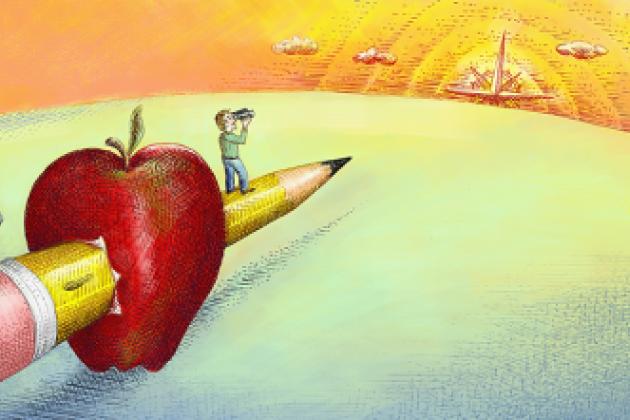- Energy & Environment
- Politics, Institutions, and Public Opinion
Editor’s note: This essay is an excerpt of a larger paper the author delivered at a conference of the Hoover Institution, “Governing in a Time of Technological Change.”
Language is arguably the most fundamental human tool. At certain points in history, when other technologies have enhanced or damaged the use of language, major changes in world order have resulted. We are witnessing such a phenomenon now.
At present, a “language revolution” is under way, propelled by an eruption of electronic communication technologies that, while enhancing productivity, are also creating social and political chaos. The e-revolution in communication is now challenging, even threatening, the conduct of responsible governance. Thanks to digital technologies, marginal sociopaths are being empowered to organize and act collectively as never before; dictatorial regimes are perfecting powerful tools to monitor and suppress entire populations; and instantaneous popular judgments on political issues are beginning to overwhelm representative government as designed by the Founders to avoid the chaos-producing “direct” democracy of pre-modern societies.
The e-revolution in language is the next great “Revolution” in human history. Through it, any person anywhere in the world can instantly and constantly communicate with every other person. At the same time, technology has taken command of language to both serve technology and distort linguistic standards; one need only look at the average self-published book, blog post, or tweet for evidence. This process disrupts and corrodes the foundations of the modern era and shows no sign of being able to positively reconstruct from what it is tearing down.
In three significant cases, the modern approach is now being undermined by the disruptive powers of twenty-first-century language technology.
Empowering Sociopaths
Freud’s Civilization and its Discontents, revealed that the benefits of civilized order and progress require the relegation of powerfully disruptive behaviors and desires to “the unconscious” mind. While many assume that societies primarily shape individuals, “Freud thought that it was the other way around,” according to Louis Menand, “that society is just a macro form of the individual, and takes its imprint from individual psychology.” Most today would agree that human and societal development is a two-way street, dependent on one another.
Today’s social media distorts this relationship. Instant communication by way of platforms such as Twitter, make it possible for individuals to immediately express the slightest emotionally disruptive and damaging reaction to events or ideas to a worldwide audience. Opinions and private outbursts once perceived as self-harmful blunders, resolved by improving one’s repressive subconscious mechanisms, are now instantly exposed to multitudes in permanent form. Civilization depends upon the time and ability to contain such eruptions; the “discontents” created by acts of self-control are the price of civil society. Were every discontent expressed, the public sphere would collapse as “all communication, all the time,” instantly, produces a surrounding effect. As the astute columnist Peggy Noonan wrote, we are agitating and exciting “the unstable” sector of the population, a sector that increasingly grows larger, a Pandora’s Box of once subconscious partisan venom breaking open as no one becomes able to suppress the slightest discontent.
Enlarging Dictatorial Powers
As the individual is “liberated” by the ability to promulgate unconstrained feelings in every direction, the governing regimes of the world are gaining new powers of surveillance, intrusion, and control over their populations. The 2011 “Arab Spring” uprisings were considered at first to be made possible by the new language-spreading technologies in every young person’s hand; it was widely agreed, at the time, that such tools of expression would be beyond the abilities of dictators to control. Such an assumption was foolhardy; the Arab Spring was crushed in a few short months as the old powers—colonels, hereditary monarchs, strong-armed clans with puppet “parliaments”—regained control even as they were assaulted by even more ideologically autocratic radicals claiming religious dominion.
The major one-party authoritarian regimes, too, notably Russia and the People’s Republic of China, are perfecting their own domination of the new languages of disruption: techniques of interception, cooperation, blockage, elimination, falsification, and more. This reality sharply reverses earlier assumptions that major multinational corporations would be replacing states as the most potent international entities. Recent steps by the People’s Republic of China to assert “cyber-sovereignty” bear this out. When Apple had no choice but to accept the PRC’s ban on “apps” that could bypass the regime’s “Great Firewall of China,” the power of the autocratic state over the private corporate entity was made clear to all.
This trend has begun to give authoritarian regimes unprecedented powers to suppress freedom of speech and to indoctrinate entire populations in twenty-first-century versions of Orwellian “Newspeak” such as China’s propaganda that communism and capitalism are one and the same.
Disdaining the American Design: From Moderate Republic to Direct Democracy
Another recent phenomenon is the deterioration of respect traditionally given to “the deliberative process.” This process, once deemed essential to the civil discourse of a polity, values balance and consensus over strident factionalism. Individuals and associations engaged in the political process were allowed the space, time, and confidentiality to examine and debate a range of options, unexposed to outside criticism, before reaching their decision and putting it before the public, and the opposing party’s view. The new language technologies, combined with crowbar-like legal methods, have made the deliberative process nearly extinct. With every individual, insider or outsider, now in effect in possession of a recording, filming, broadcasting, and publicizing piece of handheld equipment, any and all varieties of thoughtful expression are so vulnerable to premature exposure that periods for careful deliberation prior to acts of decision have become rare. Equally troubling, even when such occasions are held, open discourse on policy is increasingly subject to political or legal risk.
Democracy itself, in the unique form designed by the Founders and described in Tocqueville’s Democracy in America, is being disrupted by the new techniques of instantaneous language. To the ancient world, democracy was a tempting ideal, but understood to be dangerous, a producer of chaos that called forth a tyrant to restore order. Thucydides’s Athens provided the classic case in point: swift, direct (thumbs up or down), with no patience for deliberation, and unable to prevent the deterioration of its language until “words lost their meaning.” The result, as Alexander Hamilton wrote in Federalist Papers No. 6, was “that famous and fatal war, distinguished in the Grecian annals by the name of the Peloponnesian war; which, after various vicissitudes, intermissions, and renewals, terminated in the ruin of the Athenian commonwealth.”
The result was the Founders’ design for a republic that would be utterly unique: buffered against the dangers of mass decisions swiftly taken; checked and balanced, with separated powers and layered sovereignty; all within a concept of genius, Federalist No. 10, that would enable democracy to function effectively on a continental scale, the world’s first, and still only, such example. The United States was, and still is, as Professor Samuel Huntington recognized, a “pre-modern” polity in a modern world. If the modern era is ending, the United States should be better suited to manage such change than any other nation.
But not if the safeguards that make America an exceptional democracy are forfeited, lost without awareness of how or why. Yet, the e-revolution can do this. The array of techniques that turn language into instantaneous power of opinion, all in the touch of a screen or a handful of words, threatens to override the protections instituted when the republic was born.
The electronic revolution is a language revolution. Each of the revolutions of the modern age—French, Russian, Chinese—has brought ruination. The world is now afflicted by an Islamist revolution, begun after the collapse of the Ottoman Empire and Caliphate in the years after World War I. It produced the Islamic Republic of Iran in 1979, has been carried on by al-Qaeda and the Islamic State, and is violently opposed to every element of the established modern international state system. Like all modern revolutions, it promulgates a concocted language as a weapon of power.
Only the American Revolution understood that language, like any tool or technology, must be used with care. The Founders understood that decisions made now, by those with power now, thinking only about now, guarantee disaster.
Understanding the inextricable centrality of language to democracy begins with the way democracy in America was designed to overcome the flaws of ancient democracy. Athens in the Periclean Age was archetypically democratic: recognized as potentially the best form of governance, but also as dangerously prone to collapse. As portrayed in Thucydides’s Peloponnesian War, Pericles spoke proudly of Athenian democracy as swift to act by the direct decisions of the demos, the people, and unencumbered by institutions that would delay such actions. But language broke down under political, military, and societal pressures; the undeliberated decision to send a naval expedition to Sicily failed because the values of patience and foresight, the proper allocation of resources, and mature deliberation lost meaning.
The Founders of the United States knew the story of Athens in the Peloponnesian War well. They were determined that America would become a free republic, not a direct democracy. It would be a government by representatives, with dispersed sovereignty, three equal branches of government, and a variety of “checks and balances.”
Other political thinkers would add vitally important concepts to democracy in the modern world to overcome the problems faced in antiquity.
Kant, staying rigorously within the Enlightenment’s requirement to employ “reason” alone without dependence upon outside foundational authorities, such as religion, argued his way step-by-step to demonstrate that the core of political success was transparency because the purpose of a state was justice, and that could only be had when the people were sovereign and could demand that their government’s actions could be open to examination and approval. Transparency could only truly exist in a republic, and a republic’s added advantage would be that a free people would be disinclined to go to war or would hasten to end a war if war could not be avoided.
Hegel, as noted earlier, added the centrality of history, specifically “the history of the consciousness of freedom.” In other words, history had a direction, a progression, propelled by freedom.
Tocqueville supplemented this view, seeing democracy as a force of history observable across the past several hundred years. But he knew that only if “democracy in America” is conducted wisely can democracy continue its modern trajectory.
Two concerns were paramount. First, democracy’s powerful pressure is for ever-greater equality. Equality is essential, but liberty must be maintained as well so that equality does not eradicate freedom in the drive to make all outcomes equal. Second, there is, Tocqueville observed, a distinctively American democratic logic chain: religion informs mores, which inform laws, which ensures liberty, and liberty protects religion. America is unique, Tocqueville said (we could also say “exceptional”), in that only in America are religion and liberty compatible; elsewhere, religion tends to suppress liberty, and liberty tends to resent and resist the demands of religion. But in America, religion sees liberty as the protector of its observances, and liberty sees religion as the cradle of its birth (as when the New England Puritan congregation was easily transposed into the town meeting.)
The e-revolution in communication is doing damage to this Tocquevillian narrative of American exceptionalism by making every issue “presentist” as a matter of struggles for power in current politics. If “history” appears in this battle for supremacy in current events, it is ignorantly distorted in the service of scoring power points here and now.
—
Charles Hill is a research fellow at the Hoover Institution, as well as the Brady-Johnson Distinguished Fellow in Grand Strategy and a senior lecturer in humanities at Yale.
















